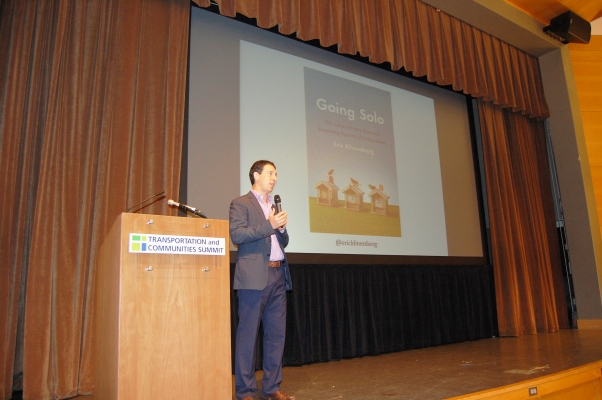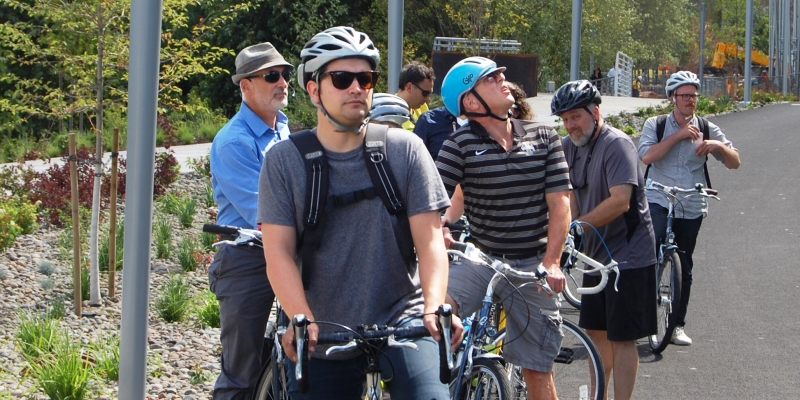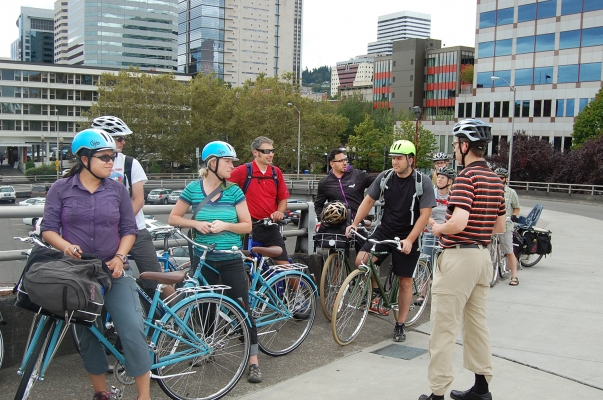The first Transportation and Communities Summit picked up where its predecessor summit left off, offering a day of professional development opportunities and a few new touches. Around 275 people attended this year’s summit, held Sept. 15 at Portland State University.
The highlight for many, according to post-event surveys, was the keynote address by author and sociology professor Eric Klinenberg. Keeping alive a tradition from earlier Oregon Transportation Summits, Klinenberg’s address gave insight into an issue that intersects with transportation—in this case, the rise of single-occupant households—without directly detailing the transportation implications.
The breakout sessions allowed attendees to delve deeper into topics directly related to their professions. A full 54 percent of survey respondents called the breakout sessions the most valuable piece of the summit program. The most highly rated sessions were “Waiting to Connect,” on connected vehicles; “Something from Nothing,” on funding; “Zeroing in on Safety,” on Vision Zero; and “Baby, You can Drive my Car;” on the sharing economy.
Slides from all these presentations are available at the summit page.
For the first time, summit sessions were Webcast for those who couldn’t attend in person...
Comprehensive Bikeway Design 1.0, a popular summer workshop offered by the Initiative for Bicycle and Pedestrian Innovation (IBPI), wrapped up to a successful conclusion last week.
Hau Hagedorn, director of the IBPI, has seen the annual workshop grow into a one-of-a-kind training opportunity for bicycle and pedestrian professionals.
“The course is comprehensive. It isn't just about bikeway design. It's about everything a city can do to become more bike-friendly, including policies that support cycling and land uses that encourage active transportation,” Hagedorn said.
With 10 participants from six states, this year’s workshop helped further the IBPI’s goal of expanding America’s bicycle and pedestrian infrastructure to encourage healthier, more sustainable forms of transportation. The participants came from a diversity of disciplines including community and bicycle planning, academic research and political leadership, and traveled from as far away as Pennsylvania to visit Portland’s bicycle culture.
“I think it reaffirms that this is a unique opportunity, for people to come and see what has been done in Portland. This didn't happen overnight. It gives a good idea of what can be done in other places,” Hagedorn said.
The five-day instructional course began on Sunday, July 26, with a tour of...
Read moreThe Initiative for Bicycle and Pedestrian Innovation has unveiled the most ambitious year of professional development offerings in its history.
For the first time, the schedule includes Webinars, with the first taking place Feb. 27. Offerings also include courses and workshops geared toward practitioners and university faculty members. There’s also a two-week study abroad opportunity to learn about sustainable transportation in the Netherlands.
The course offerings include a newly added advanced bicycle design and engineering workshop. The workshop is geared toward professionals who have taken the original IBPI course or who serve communities with a developed bicycle network.
“More than 120 professionals have taken the course since 2008,” said Hau Hagedorn, who manages the IBPI program. “We’ve reached the threshold of educating professionals where there’s the need to take this to the next level of expertise.”
Continuing education credits are available for each workshop and Webinar. Click here for details on the individual course pages.
Registration is now open for IBPI’s inaugural Webinar on Feb. 27: “We are Traffic: Creating Robust Bicycle and Pedestrian Count Programs.” As agencies looking to improve bicycle and pedestrian infrastructure have learned, it doesn’t count if it’s not counted....
Read more


